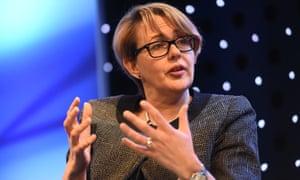
UK Sport is considering implementing a full-time investigations unit after a string of controversial governance issues including the recent look into the culture at British Cycling.
Announcing a governance code for all sports governing bodies that will require at least 30% of board members to be women if they want to continue to receive public money from Sport England and UK Sport, the latter said it was also examining whether to introduce a full-time investigations unit.
“What UK Sport will be doing is looking in the next year at whether we have the right structures in place in British sport in terms of an investigatory function,” said the UK Sport chief operating officer, Simon Morton. “We have been involved in quite a few independent reviews in the last 12 months and it’s making us think about whether we have the right functions in British sport to handle those.”
Morton added: “It’s very early days but we understand there is an increasing need for British sport to have an investigatory function around independent reviews. Rather than having to reinvent the wheel every time an independent review comes around, having clarity on the process would be beneficial.”
Baroness Tanni Grey-Thompson is chairing a review on the wide-ranging issue of the duty of care sports have for athletes, while the British Rowing chair, Annamarie Phelps, is leading a specific inquiry into the culture of British Cycling amid allegations of bullying and sexism.
Last week an internal British Cycling review found the former head coach Shane Sutton had been guilty of using inappropriate and discriminatory language. The Phelps review is expected to be published next month.
It was also confirmed the government may withhold support for any bid by the Football Association to host the World Cup or European Championship if it fails to adhere to the code, which will come into force on 1 April next year.
Repeated efforts to force the FA to reform have failed since Lord Burns recommended changes to the board and council 11 years ago. The sports minister, Tracey Crouch, has already said the FA faces losing £30m in government funding over four years if it fails to comply.
As well as making all reasonable efforts to meet the 30% target on gender diversity, the FA and other governing bodies must also ensure the main board has primacy on decision-making. That would effectively mean the FA councillors voting to relinquish their own power. The most recent attempt at reform, by the former chairman Greg Dyke, was unceremoniously rejected by the council but his successor, Greg Clarke, and the chief executive, Martin Glenn, have said they are committed to making changes.
The Sport England director of sport, Phil Smith, said the FA and other governing bodies would not be expected to comply on 1 April next year but would have to keep to a timetable to be agreed over the coming months.
Morton said few governing bodies complied with the code. “The mandate from government was that they wanted something tough and was the gold standard for sport,” he said.







